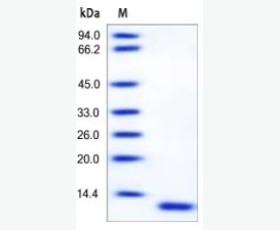Recombinant Human Ubiquitin Carboxyl-Terminal Hydrolase Isozyme L3/UCH-L3
| Product name: | Recombinant Human Ubiquitin Carboxyl-Terminal Hydrolase Isozyme L3/UCH-L3 |
| Source: | E.coli |
| Purity: | Greater than 95% as determined by reducing SDS-PAGE. |
| Buffer Formulation: | Supplied as a 0.2 μm filtered solution of 50mM TrisHCl, 150mM NaCl, 1mM DTT, 50% Glycerol, pH 8.0. |
| Applications: | Applications:SDS-PAGE; WB; ELISA; IP. |
| Storage: | Avoid repeated freeze/thaw cycles. Store at 2-8 oC for one month. Aliquot and store at -80 oC for 12 months. |
| UOM: | 100ug/50ug/200ug/1mg/1g |
| Source | E.coli |
| Description | Recombinant Human Ubiquitin Carboxyl-Terminal Hydrolase Isozyme L3 is produced by our E.coli expression system and the target gene encoding Met1-Ala230 is expressed with a 6His tag at the C-terminus. |
| Names | Ubiquitin Carboxyl-Terminal Hydrolase Isozyme L3, UCH-L3, Ubiquitin Thioesterase L3, UCHL3 |
| Accession # | P15374 |
| Formulation | Supplied as a 0.2 μm filtered solution of 50mM TrisHCl, 150mM NaCl, 1mM DTT, 50% Glycerol, pH 8.0. |
| Shipping |
The product is shipped on dry ice/ice packs. |
| Storage |
Store at < -20°C, stable for 6 months after receipt. Please minimize freeze-thaw cycles. |
| Purity |
Greater than 95% as determined by reducing SDS-PAGE. |
| Endotoxin | Less than 0.1 ng/µg (1 IEU/µg) as determined by LAL test. |
| Amino Acid Sequence |
MEGQRWLPLEANPEVTNQFLKQLGLHPNWQFVDVYGMDPELLSMVPRPVCAVLLLFPITEKYEVF RTEEEEKIKSQGQDVTSSVYFMKQTISNACGTIGLIHAIANNKDKMHFESGSTLKKFLEESVSMS PEERARYLENYDAIRVTHETSAHEGQTEAPSIDEKVDLHFIALVHVDGHLYELDGRKPFPINHGE TSDETLLEDAIEVCKKFMERDPDELRFNAIALSAALEHHHHHH
|
| Background | Ubiquitin Carboxyl-Terminal Hydrolases (UCHs) are a family of cysteine hydrolases. They catalyze the hydrolysis of amides, thioesters and esters, peptide and isopeptide bonds formed by the C-terminal Gly of ubiquitin. Up regulation of UCHL3 is associated with uterine cervical neoplasms. UCHL3 is implicated in age related cognitive disorders. UCHL3 also promotes adipogenesis and insulin signaling. In mice, UCHL3 knockout have been shown to be resistant to diet-induced obesity. |














